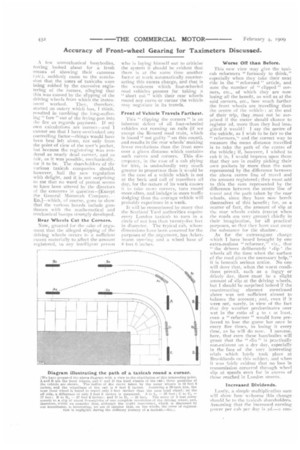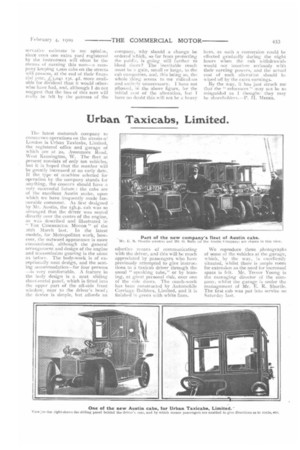Accuracy of Front-wheel Gearing for Taximeters Discussed.
Page 16

Page 17

If you've noticed an error in this article please click here to report it so we can fix it.
A few unmechanical busybodies, having looked about for a fresh means of showing their cuteness (sic), suddenly came to the conclusion that the users of taxicabs were being robbed by the excessive registering of the meters, alleging that this was caused by the slipping of the driving wheels from which the instrument worked. They, therefore, started an outcry which has, I think, resulted in tumbling the long-suffering " fare " out of the frying-pan into the fire as regards payment. If my own calculations are correct—ancl cannot see that I have overlooked any controlling factor—things would have been best left alone, not only from the point of view of the user's pocket, but because the registering was rendered as nearly dead correct, and as as it was possible, mechanically, for it to be. The shareholders of the various taxicab companies should, however, hail the new regulation with delight, and it is not surprising to me that no word of protest seems to have been uttered by the directors of the concerns in question—[Except the General Motorcab Company.ED.]—which, of course, goes to show that the various boards include gentlemen with the mathematical and mechanical bumps strongly developed.
Rrar Wheels Cut the Corners.
Now, granted for the sake of argument that the alleged slipping cif the driving wheels occurs to a sufficient extent materially to affect the amount registered, to any intelligent person who is laying himself out to criticise the system it should be evident that there is at the same time another factor at work automatically counteracting this excess charge, and that is the weakness which four-wheeled road vehicles possess for taking a " short cut " with their rear wheels round any curve or corner the vehicle may negotiate in its travels.
Front of Vehicle Travels Farthest.
This " clipping the corners " is an inherent defect of all four-wheeled vehicles not running on .rails (if we except the Renard road train, which is found " not guilty " on this count), and results in the rear wheels' making fewer revolutions than the front ones over a given distance which contains such curves and corners. This disenepancy, in the case of a cab plying for hire, is undoubtedly very much greater in proportion than it would be in the case of a vehicle which is not at the beck and call of travellers all day, for the nature of its work causes it to take noire corners, turn round more often, and indulge in more traffic dodging than the average vehicle will probably experience in a week.
It will be remembered by many that the Scotland Yard authorities require every London taxicab to turn in a circle of not less than twenty-five feet in diameter. The typical cab, whose dimensions have been assumed for the purposes of the argument, has Ackermann steering and a wheel base of feet 6 inches.
Worse Olf than Before.
This new view may give the taxicab reformers " furiously to think," especially when they take their next ride in the " reformed " article, and note the number of " clipped " corners, etc., of which they are now losing all the benefit, as well as at the said corners, etc., how much farther the front wheels are travelling than the centre of the vehicle : at the end of their trip, they .must not be surprised if the meter should chance to register 2d. more than they had ima gined it would 1 say the °entre of the vehicle, as I wish to be fair to the " reformers," and the correct way to measure the mean distance travelled is to take the path of the centre of the vehicle; if, however, I wished to rub it in, I would impress upon them that they are in reality picking their own pockets by more than the sum represented by the difference between the above centre line of travel and the amount registered ; they must add to this the sum represented by the difference between the centre line of travel and the path taken by the rear wheels, since they have now bereft themselves of this benefit; for, as a matter of fact, the amount of slip at the rear wheels exists (except when the roads are very greasy) chiefly in their imagination, for all practical purposes, so that they have cast away the substance for the shadow.
As for the extravagant charge which I have heard brought by one extra-zealous "reformer," viz., that " the drivers deliberately • slip ' the wheels all the time when the surface of the road gives the necessary help," it is beneath serious notice. No one will deny that, when the worst conditions prevail, such as a foggy or drizzly day, there must be a slight amount of slip at the driving wheels, but I should be surprised indeed if the counteracting element mentioned above was not sufficient almost to balance the account; and, even if it were not, surely, in view of the fart that dry weather predominates over wet in the ratio of 4 to Tat least, even a " reformer " would have preferred to lose the game but once in every five times, to losing it every time, as he will do now. I assume, here, that even these busybodies will grant that the " sIlo " is practically non-existent on a dry day, especially in the face of the very interesting trials which lately took place at Brooklands on this subject, and when it was fairly evident that no loss in transmission occurred through wheel slip at speeds even far in excess of those reached in London streets.
Increased Dividends.
Lastly, a simple multiplication sum will show how welcome this change should be to the taxicab shareholders. Assuming that the increased earning prnyer per cab per day is 2(1.-2 COTS servatiye estimate in my opinion, since even one extra yard registered by the instrument will often be the means of earning this sum—a company keeping I,000 cabs on the streets will possess, at the end of their financial year, ,/:3,041 t3s. 4d. more available for dividend than it would otherwise have had, and, although I do not suggest that the loss of this sum will really be felt by the patrons of the
company, why should a change be ordered which, so far from protecting the public, is going still further to bleed them? The inevitable result must be a gain, small or large, to the cab companies, and, this being so, the whole thing seems to me ridiculeus and entirely unnecessary. I have not allowed, in the above figure, for the initial cest of the alteration, but I have no doubt this'. will not be a heavy
item, as such a conversion could be effected gradually during the night hours when the cab withdrawals would not interfere seriously with their earning powers, and the actual cost of such alteration should be wiped off by the extra earnings. By the way, it has just struck me that the " reformers " may not be so misguided as I thoughtthey may be shareholders.—P 11. MEEes.






















